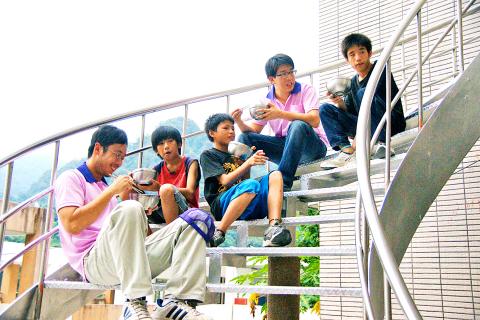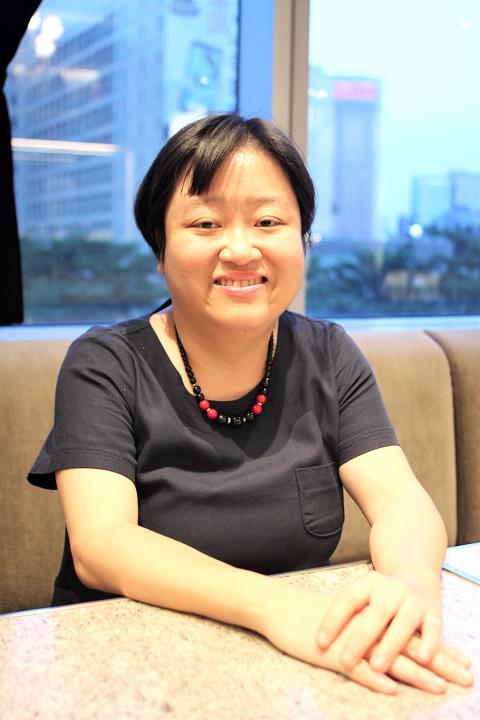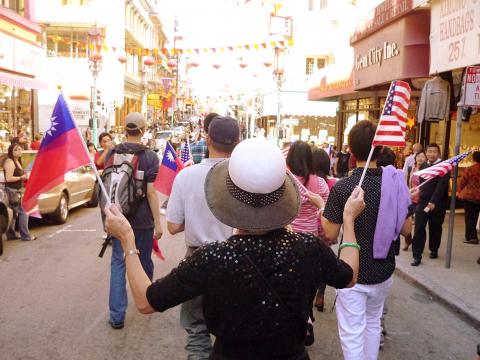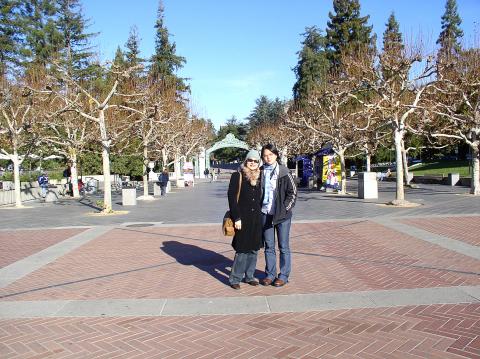Although Eric Ku’s (顧國瀚) family moved to the US when he was four, his parents still expected him to observe “traditional Chinese values” and speak Mandarin at home.
“I feel very Taiwanese in a restrictive kind of way when spending time with family,” Ku says.
But this also fostered a sense of kinship with Taiwanese culture. Six years ago, he was motivated to move back when he found a job lecturing in English instruction at the University of Taipei.

Photo courtesy of Eric Ku
At the same time, Ku’s students found his decision to return to Taiwan “puzzling.” They are enamored of migration to the US, seeing it as “an opportunity and dream that seems too far out of reach,” he says.
With Asia in the driver’s seat of global economic growth, return (and reverse) migration to the region has been surging in the past few decades. Returning migrants like Ku make up a vital and growing pool of talent in Taiwan.
Yet reentry is rarely easy for returnees, who must navigate divergent cultural expectations and variegated identities, all while trying to nurture families and careers. Their experiences make it clear that the promise and privilege of a Western education is not without complications in Taiwan.

Photo: Davina Tham, Taipei Times
‘PARACHUTE KIDS’
Last Friday, Ku was among two dozen professionals of multicultural backgrounds who gathered in the stylish office of a Taipei start-up to take in new research on “parachute kids” by sociologist Kristy Shih (施羽潔), who is a professor at California State University, Long Beach.
Parachute kids — called “young exchange students” (小留學生) in Mandarin parlance — are minors aged eight to 17 who migrate from Asia to attend school in North America, Europe, Australia and New Zealand, unaccompanied by parents.

Photo courtesy of Eric Ku
Living arrangements vary from the unsupervised to those cared for by an extended relative or paid guardian. Shih has even come across families who pool resources to send a generation of siblings and cousins overseas, accompanied by an older female relative to look after them.
Taiwanese parachute kids first set off in the 1980s, amid rapid economic growth and new affluence. Overseas education was a coveted status symbol — a way for a family to accumulate social, cultural and economic capital, and distinguish itself from other middle-class households.
“The ideal is that when the children are sent abroad, they acquire English language ability. That already gives them a leg up” in the labor market, Shih tells the Taipei Times.

Photo courtesy of Cathy Hwang
Shih cites political uncertainty as another reason why parents wished to send their children out of Asia in the 1980s. Motivations often differed by gender, too — sons were sent abroad to avoid military conscription, while daughters were sent abroad to care for their brothers and at the same time receive their own education.
In 1990, a study released by the University of California, Los Angeles estimated that there were 40,000 Taiwanese parachute kids in the US. There are no complete statistics, although Shih believes that the population has shrunk from its peak in the 1990s and 2000s. (In contrast, enrollment from China has rocketed up to become a leading source of international students in American schools.)
HARD LANDINGS
Reasons for returning to Taiwan can be divided into three broad categories: for family, for professional development and because of an inability to secure residency in the immigration destination.
Ku, who is working toward a doctorate in English instruction, jumped at the opportunity when he found an opening in his chosen field in Taiwan.
He acknowledges that his overseas education, specifically his status as a “native speaker” of English, was crucial to securing a tenure-track teaching position at the University of Taipei, fresh out of his master’s program in the US.
“A Taiwanese scholar with the same credentials that I had couldn’t have gotten the job,” he says.
Conversely, a major challenge of moving back to Taiwan was “feeling like I had little agency or ownership over certain parts of my life due to my mediocre Chinese language skills,” Ku says.
One example was his weak command of academic Mandarin, which made work documents and grant applications hard to decipher.
Many Taiwanese parents who send their children overseas to study do so in the belief that a Western education confers only advantages in the local labor market.
In the early days of the parachute phenomenon, it was commonly thought that “if you have a US degree, that’s worth more than a degree from Taiwan,” Shih says. “In reality, now in 2019, [that] may or may not be true.”
Parachute kids whom Shih interviewed for her research told her that a Western university degree could open doors, “but then it didn’t help with salary. They still receive about the same salary as their Taiwanese co-workers.”
Compared to other developed economies, the long work hours and relatively low incomes in Taiwan make it hard for many returnees to justify the earlier investment in their overseas education.
Many returnees also face social challenges in navigating workplace culture and connecting with colleagues. Those who work in local companies in traditional industries are more likely to encounter jealousy from colleagues who deride their Western educations.
Cathy Hwang (黃世佳), who works in finance, lived with her mother and siblings in the US between the ages of 14 and 28. While she describes her transition back to Taiwan as “generally a smooth one,” she has found it challenging to strike up new friendships with locals.
“I think culturally ‘networking’ or just meeting new people is not something young locals are as proactive with compared with ABCs and Westerners,” she says, using the abbreviation for American-born Chinese.
And while many parachute kids are motivated by a desire to be closer to family, the move back home necessitates a renegotiation of parental boundaries.
Shih has heard many complaints about invasions of privacy and mismatched cultural expectations, such as from a returnee whose parents complained that she didn’t spend more time at home. In fact, for this former parachute kid, her idea of home was the house where she lived by herself.
FLEXIBLE IDENTITIES
Differences in culture, language, values and lifestyle are at the core of identity — and that seems to be the ultimate question that every transnational Taiwanese hyphenate eventually comes up against.
Ku identifies as Taiwanese American, while Hwang considers herself “Taiwanese but with both American and Chinese influences.”
What each entails is dynamic and unique to the individual.
“I think the Confucian values that were taught in the Taiwanese education system have served me well when it comes to my relationships with my parents, siblings and family members,” Hwang says. But she also attributes her optimistic personality to “being American.”
Shih asks all of the respondents in her study how they identify in different areas of their life. Most choose some combination of Taiwanese, American, Asian and Chinese. An intriguing pattern emerged.
As adults, the parachute kids tended to identify as American in the professional sphere, but Taiwanese or Asian in the personal sphere — meaning food, family relationships and friendships.
Hwang, who says she “certainly [has] the Taiwanese palate when it comes to food,” falls in line with this trend.
Ku, who migrated to the US with his family, says that his home and school life in California were filled with Asian influences. He managed to enjoy an Asian upbringing even in the US, although it was not without moments of discomfort.
“I often felt like I had to learn ‘how to be American’ and that I had to perform ‘being American,’” he says.
In Taiwan, Ku is often expected to be the American point of reference for local colleagues and students. He feels more Taiwanese when he has an opportunity to play host to friends visiting from the US.
There are no easy labels. But sometimes, it comes down to a conviction that is felt, rather than reasoned out.
“When students ask me why I’ve chosen to stay in Taiwan rather than move back to [the US], I usually tell them that it’s because I feel at home in Taiwan, like I can be my natural self in Taiwan,” Ku muses.

This is the year that the demographic crisis will begin to impact people’s lives. This will create pressures on treatment and hiring of foreigners. Regardless of whatever technological breakthroughs happen, the real value will come from digesting and productively applying existing technologies in new and creative ways. INTRODUCING BASIC SERVICES BREAKDOWNS At some point soon, we will begin to witness a breakdown in basic services. Initially, it will be limited and sporadic, but the frequency and newsworthiness of the incidents will only continue to accelerate dramatically in the coming years. Here in central Taiwan, many basic services are severely understaffed, and

Jan. 5 to Jan. 11 Of the more than 3,000km of sugar railway that once criss-crossed central and southern Taiwan, just 16.1km remain in operation today. By the time Dafydd Fell began photographing the network in earnest in 1994, it was already well past its heyday. The system had been significantly cut back, leaving behind abandoned stations, rusting rolling stock and crumbling facilities. This reduction continued during the five years of his documentation, adding urgency to his task. As passenger services had already ceased by then, Fell had to wait for the sugarcane harvest season each year, which typically ran from

It is a soulful folk song, filled with feeling and history: A love-stricken young man tells God about his hopes and dreams of happiness. Generations of Uighurs, the Turkic ethnic minority in China’s Xinjiang region, have played it at parties and weddings. But today, if they download it, play it or share it online, they risk ending up in prison. Besh pede, a popular Uighur folk ballad, is among dozens of Uighur-language songs that have been deemed “problematic” by Xinjiang authorities, according to a recording of a meeting held by police and other local officials in the historic city of Kashgar in

It’s a good thing that 2025 is over. Yes, I fully expect we will look back on the year with nostalgia, once we have experienced this year and 2027. Traditionally at New Years much discourse is devoted to discussing what happened the previous year. Let’s have a look at what didn’t happen. Many bad things did not happen. The People’s Republic of China (PRC) did not attack Taiwan. We didn’t have a massive, destructive earthquake or drought. We didn’t have a major human pandemic. No widespread unemployment or other destructive social events. Nothing serious was done about Taiwan’s swelling birth rate catastrophe.